Engadget has been testing and reviewing consumer tech since 2004. Our stories may include affiliate links; if you buy something through a link, we may earn a commission. Read more about how we evaluate products.
Samsung Galaxy Watch review: Safe but satisfying
The company didn't break much new ground here.
Samsung is one of those companies you can count on to take interesting risks, like resuscitating the stylus or reselling a version of a phone that was best known for bursting into flames. With its latest wearable, the Galaxy Watch, Samsung couldn't have played things safer: It combined some of the Gear S3's design language with some Gear Sport fitness features and added a handful of new software flourishes to boot. It's about as measured as a hardware update gets. That's not necessarily a bad thing though: While the Galaxy Watch probably isn't the most interesting wearable we'll see this year, it's still a solid performer with some room to grow.
Hardware
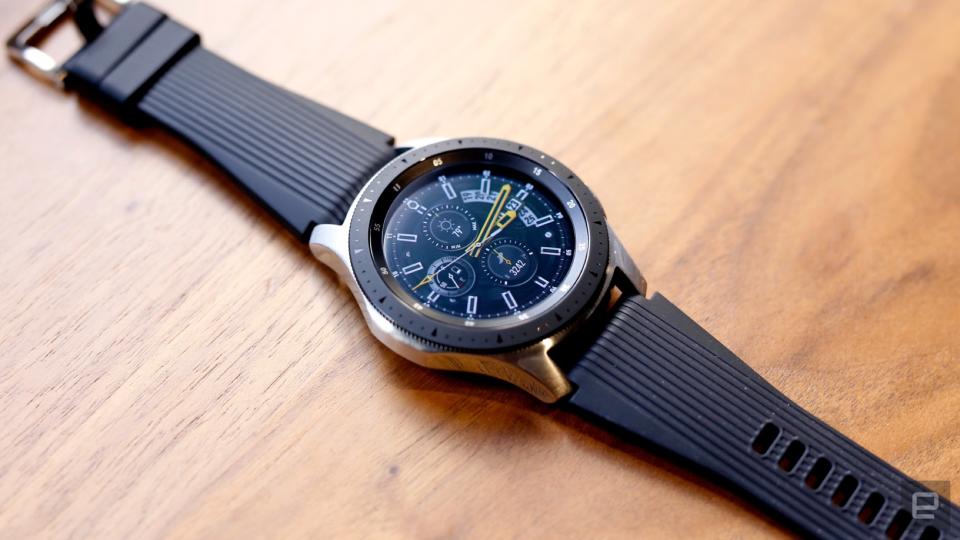
There are two versions of the Galaxy Watch: a 42mm model ($329+) that comes in Rose Gold and a handsome blacked-out finish, and the shiny 46mm model ($349+) I've spent the past week with. You'll get either a 1.2- or 1.3-inch screen, respectively, and as usual for Samsung, they're plenty crisp and bright, even under harsh sunlight. No matter which you find more appealing, they all use the same dual-core Samsung Exynos chipset and 768MB of RAM, which keep everything running smoothly -- save for the occasional hiccup when switching between apps. (The LTE versions of the Galaxy Watch have double the RAM, so those might run more smoothly.)
More importantly, Samsung is sticking with its rotating bezel for navigation, and it's still a thrill to use. Scrolling through widgets and installed apps is a breeze, and little touches -- like the subtle clicks as the bezel locks into position -- make the Galaxy Watch feel like a premium timepiece. To be clear, you don't need to use the bezel since swiping all over the touchscreen gets the same stuff done, but you'd be a fool not to. As far as I'm concerned, this is still the most elegant way to interact with a smartwatch. The spinning bezel doesn't interfere with the Watch's water resistance either. Like the Gear Sport before them, the Galaxy Watches are rated for 5ATM water resistance -- that means you can dunk them in the water just fine, but they'll also hold up well during your intense swims.
Normally, I'd recommend whichever version of a smartwatch looks best on your wrist, but there's a big difference in battery life here. The larger one I've been testing has a 472mAh battery, which easily hit four full days off a single charge. You could squeeze even more juice out of it by turning on battery-saver mode. Once enabled, it throttles performance and shuts off every feature but calls, messages and notifications. You're also left with a monochrome color mode and a stripped-down watch face with the time and little else. It's certainly helpful, but using this mode more than occasionally defeats the purpose of having a smartwatch in the first place.
If you're using the smaller version of the Watch (like my colleague Cherlynn), you can expect it to run for between two and two-and-a-half days before needing a charge. That's not exactly a surprise, considering the 42mm Watch has a battery that's close to half the size of its bigger companion, but it does mean you're better off splurging on the bigger model.
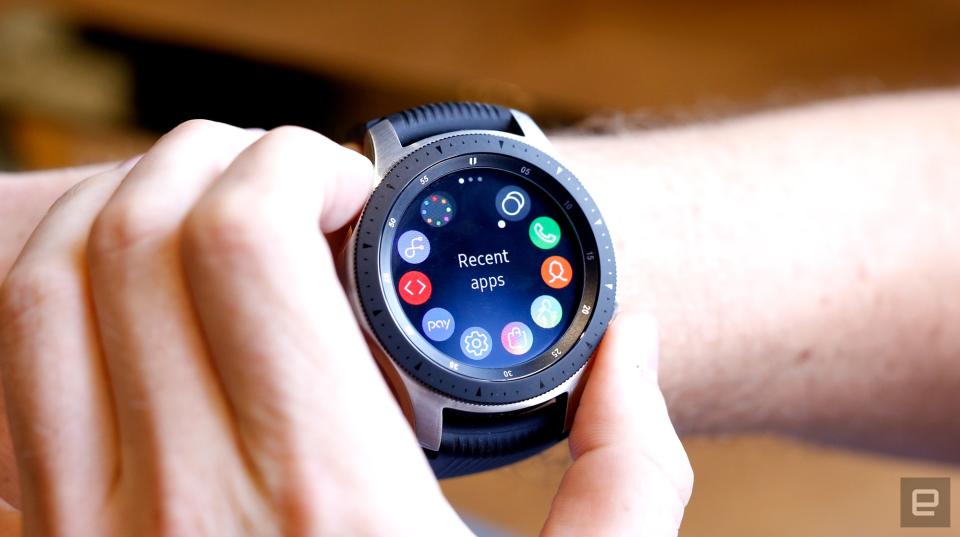
In use
The Galaxy Watch runs Samsung's in-house Tizen operating system, and man, it has come along way since the old days. Samsung says there are thousands of apps and watch faces available for the Galaxy Watch, and the company does a respectable job highlighting the really good stuff in its Galaxy Apps store.
While the number of Watch-friendly Tizen apps has grown pretty dramatically over the years, I'd warn you not to confuse quantity with quality. The biggest problem with Tizen right now is the same one it's always had: There's some useful stuff available, but many major app developers and services haven't thrown their support behind the platform. Sure, heavyweights like Spotify and Uber are on board, but you might run into trouble if you want specific apps on your wrist.
And then there's Bixby, the Samsung-made virtual assistant that has, uh, largely failed to impress. It's here on the Galaxy Watch to field all of your voice commands, and if nothing else, the basics are well tended to. Bixby was always quick to notice when I was calling for it, and it had little trouble sending messages and tracking exercise when asked. (That's no small feat considering I shattered a tooth partway through the review process.)
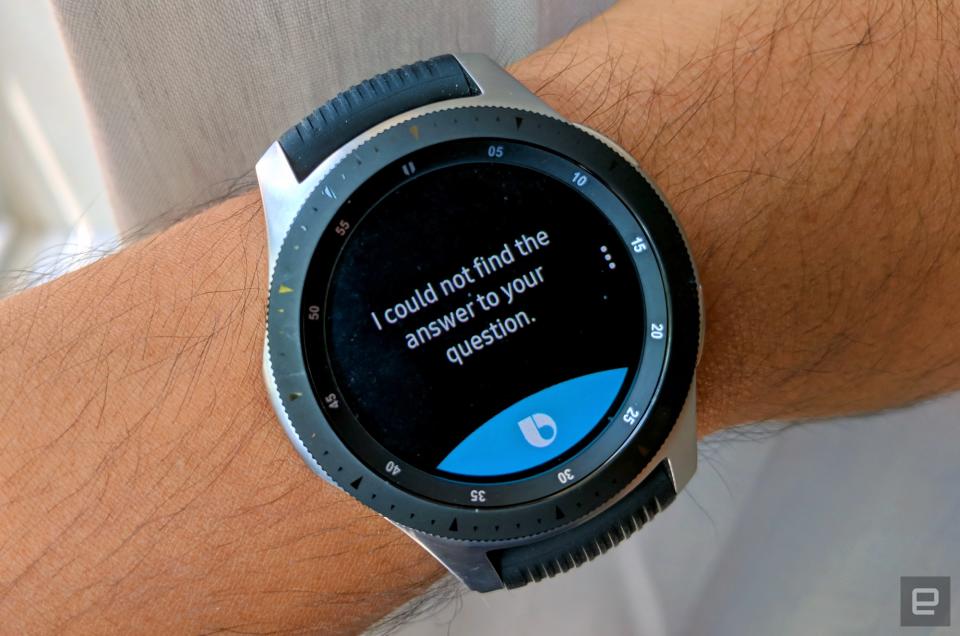
While Google Assistant and Siri largely retain their features and personalities on their respective wearables, Bixby on the Galaxy Watch just doesn't. Bixby's main draw on smartphones was that it allowed you to make fairly nuanced requests and tap into third-party software, neither of which work here. You can ask it general-knowledge questions, but it flounders more often than not. And sometimes Bixby suggests things to ask it, like "search Bermuda Triangle" -- it's just too bad that the assistant had no idea what to do with that command aside from flashing an error on-screen. Bixby might be improving on phones, but on watches? Forget about it. Google Assistant and Siri are distinctly better.
Samsung's virtual assistant might be pretty lousy, but hey, at least the Galaxy Watch is every bit the fitness tracker that the Gear Sport was. Actually, scratch that: It's even better. The Galaxy Watch can track 39 different exercises, from traditional fare like running and bench presses to more-niche options. (Here's looking at you, burpee test!) My one regret in writing this review is that my schlubby body couldn't handle all 39 exercises, but the ones I did try worked quite well. It took a toll on the Watch's battery life, but my few GPS-tracked runs seemed nice and accurate. And despite the fact that circuit training nearly killed me, the number of calories it claimed I burned were in line with results from wearables like the Fitbit Versa.

The thing is, the Watch can be finicky about what actions it does and doesn't track. Let's say it's leg day and you'd like to bust out a few squats: The Watch recognizes when your hands are on your hips and tracks each rep well. Oh, wait, what's that? You don't like your hands on your hips when squatting? Are you one of those deviants who likes to hold weights or hoist something overhead while working out? Erm, sorry. These aren't uncommon additions to the basic squat, but they completely prevent the Watch from tracking your movements. In fairness, while this is definitely less than ideal, it's hard to imagine how Samsung could teach the Watch to account for all these workout variables.
If you're forgetful like me, it helps that the Watch can also automatically recognize and start tracking certain exercises -- think running, cycling and the like. It's helpful that the feature exists, but I wouldn't rely on it. In my experience, it doesn't start tracking walks or runs until long after they've started. Really, the biggest shame is that all this helpful information winds up in Samsung's S Health app, a bit of software that sometimes doesn't make sense. Need proof? Swipe far enough to the right and you'll find a section for health stories culled from Flipboard, a longtime Samsung content partner. The right health-related content could easily prove inspirational, but instead, I got a bunch of stories about salmonella outbreaks and Stephen Colbert's anxiety. Uh, great, I guess?
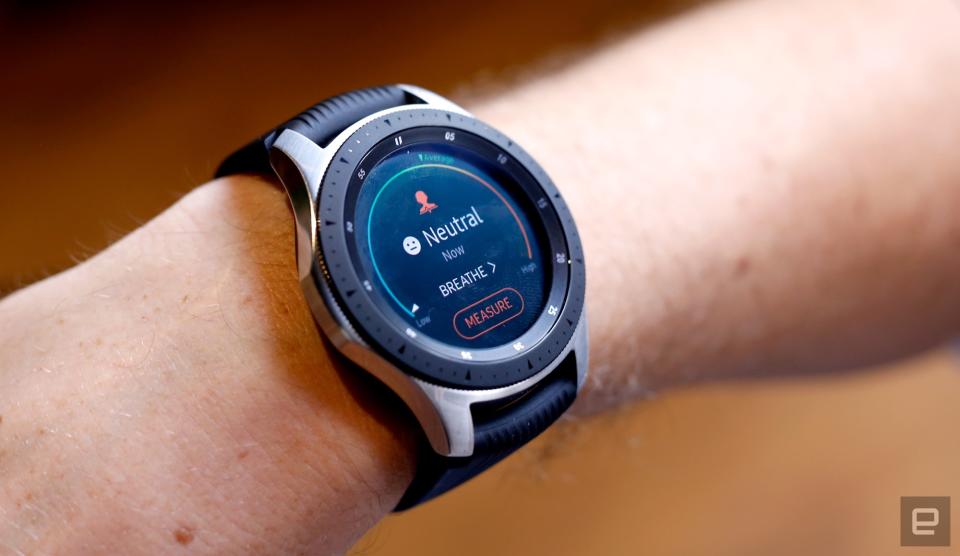
To my utter surprise, the Watch turned out to be a pretty damned good sleep tracker. I've worn this thing to bed nearly every night for a week, and its sleep estimates closely corresponded to what I saw when I checked the time before nodding off and after waking up. Well, most of the time, anyway. The Galaxy Watch can't track your brain waves or anything, so it's making educated guesses based on your movement. That means that when I lie around reading or working on crosswords before I actually roll out of bed, the Watch doesn't always think I've woken up until I'm actually vertical. This issue is a fairly small one, though, and the results generally seemed more accurate than the numbers my Fitbit Versa reports.
Samsung also squeezed a new stress-tracking feature into the Galaxy Watch, but I'm not convinced you'll actually find it helpful. It's great in theory, but all the Watch does is guess how stressed you are based on how quickly your heart is pumping at any given moment. Now, you're obviously going to know when you're freaking out better than your wearable does, but the Galaxy Watch is supposed to notice when you start to get flustered and guide you through some breathing exercises to chill out. Despite having a week that was a little more stressful than usual -- which the stress data in S Health confirmed -- the Watch never noticed and tried to help out.
The competition
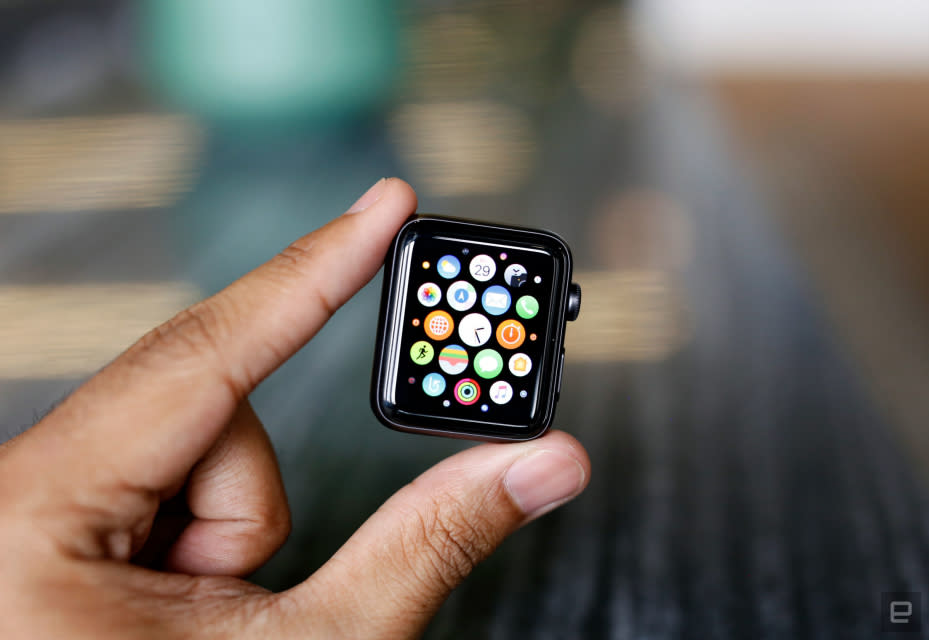
The Galaxy Watch technically works with iPhones, but if you're an Apple devotee hunting for a smartwatch, you needn't look far from home. The Apple Watch Series 3 ($329) doesn't run for quite as long as either Galaxy Watch and it's not as water-resistant, but it provides rock-solid activity tracking and the best wearable app ecosystem out there right now. We haven't seen too much movement on the Wear OS side, but Google did just unveil a big new redesign -- we'd expect the search giant's partners to show off some impressive new wearables soon.
And if you really, really care about logging miles or tracking your workouts, you're probably still better off with a more purpose-built wearable. Fitbit's Ionic ($299) is a pretty unorthodox-looking option, but it has impeccable workout credentials, plus built-in GPS and integrations with a handful of popular exercise-tracking apps. And then there's more hard-core fare like Garmin's Fenix 5 series: Prices start at $549, but you'll get tremendous battery life, support for GPS and GLONASS navigation, and even more-nuanced onboard fitness tools.
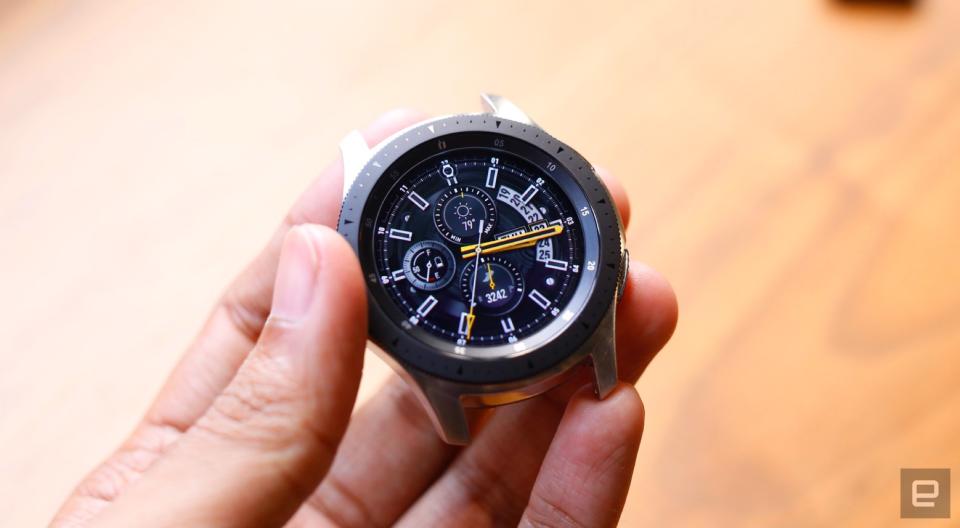
Wrap-up
The Galaxy Watch is Samsung's most fleshed-out smartwatch yet, and the company's fans won't find a better wearable. With that said, the new things Samsung added to its smartwatch formula -- Bixby and stress tracking especially -- fell short of their potential. The first time I tried the Watch on, weeks ago, I sort of offhandedly said the Galaxy Watch packed few thrills. After more than a week of testing and of searching for those thrills, I came away with little. It's a good smartwatch and I've enjoyed using it, but it still leaves me wondering if Samsung can figure out how to make an unabashedly great wearable.










